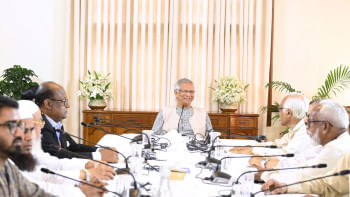Cultural movements: For the people, by the people

Kamal Lohani. Photo: Mumit M.
Music, poetry, plays and art -- culture on the whole has always had a major impact throughout our national history. Politics may bring down tyranny, change policies but it's culture that promulgates the message to the masses, generates awareness and takes a national movement to its peak. And who better to discuss the cultural aspect of national movements than Kamal Lohani? Lohani, a journalist, cultural personality extraordinaire is the Director General (DG) of Bangladesh Shilpakala Academy (BSA) at present.
"The Pakistan era -- over 23 years -- was riddled with democratic movements. What started with the Language Movement in 1952 culminated in the Liberation War in 1971," said Lohani.
"These movements of course had a cultural aspect. When the military government took over in the '60s and political parties couldn't voice their grievances directly, it was Kranti Shilpi Goshthi artistes who sang 'Manbo na e bandhaney, manbo na e srinkholey...' protesting the autocracy. The song was written and composed by Salil Chowdhury. We [Kranti members] learnt the song from Sheikh Luthfar Rahman.
"Cultural organisations Kranti and Udichi, which are committed to the national cause, were formed in the '60s. In 1967, when the Information Minister of Pakistan, Khwaja Shahabuddin denounced Tagore, Kranti, Chhayanaut and other cultural organisations formed 'Shangskritik Swadhikar Pratishtha Parishad' and held a four-day programme. The programme received overwhelming support from the masses."
Lohani continued, "Following Bangabandhu's historic speech on March 7, 1971, the whole nation united against the junta. Swadhin Bangla Biplobi Betar Kendra went on air on March 26. A group of valiant, young radio staff was operating it. The radio station faced air raid, was forced to dismantle a 10 kW transmitter and move across the border to Tripura.
"Swadhin Bangla Betar Kendra (SBBK) eventually went on air from Ballygunge Circular Road, Calcutta (now Kolkata). The radio station was part of psychological warfare. It served several major purposes: It was the voice of the Mujibnagar Government (in exile); it provided hope for the Bengalis feeling incarcerated in their own land; it boosted the morale of fatigued freedom fighters and it presented what truly was taking place in East Pakistan to the whole world.
"At SBBK, I was in charge of news. Initially I was in charge of both Bangla and English news. Later Alamgir Kabir joined and took charge of English news. Apart from news we had music, narratives, plays etc. The most popular programme was 'Charam Patra' by M.R. Akhter Mukul; another was 'Jallad-er Darbar', a play written by Kalyan Mitra. Raju Ahmed, renowned film artiste, directed and acted in it.
"We also had Urdu programmes which explained to the non-Bengali population of Pakistan why the Bengalis were fighting the Pakistani army."
Coming back to present, Lohani spoke about the current state of traditional culture in Bangladesh and the role of BSA in safeguarding and promoting it. "After 1975, religion-centric and non-Bangladeshi cultural elements were incorporated. That trend went on for years. However, we are hopeful that our traditional culture has the merits to sustain," Lohani remarked.
"BSA has taken up initiatives in this regard. We are promoting the diverse genres of Bangla folk songs, which are on the verge of extinction. Recently, we held a Baul Music Festival, featuring researchers from Bangladesh, India, Italy, UK and Japan," he said.
Victory Day celebration is on at BSA as well. This year's arrangement is extensive and has been meticulously planned -- offering music, dance, poetry recitation, plays, photography and painting exhibition and more. An installation -- a replica of a baddhyabhumi (killing field) -- has been created at BSA, drawing the attention of visitors.
The DG also has bigger plans. "With assistance from the Norwegian government (through the embassy), we're going to open up a painting preservation lab at BSA. Though a much-needed facility, this will be the first lab of its kind in Bangladesh," Lohani revealed.
"Trainers at district Shilpakala Academies all over the country are ill paid and without them one cannot expect these institutions to operate. Our major constraint is funds. However, the good news is that the Finance Minister has assured us of enhancement," Lohani concluded.

 For all latest news, follow The Daily Star's Google News channel.
For all latest news, follow The Daily Star's Google News channel. 



Comments